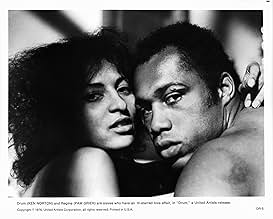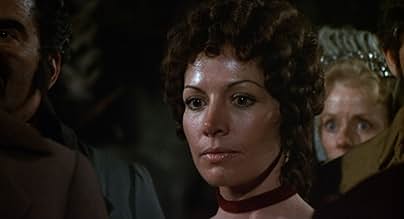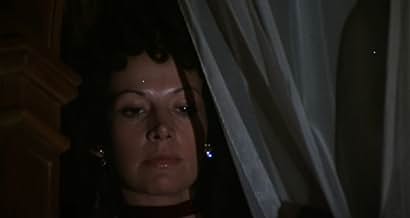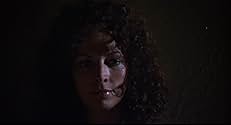AVALIAÇÃO DA IMDb
5,5/10
1,2 mil
SUA AVALIAÇÃO
Adicionar um enredo no seu idiomaA mid-19th-century mulatto slave is torn between his success as a pit-fighter and the injustices of white society.A mid-19th-century mulatto slave is torn between his success as a pit-fighter and the injustices of white society.A mid-19th-century mulatto slave is torn between his success as a pit-fighter and the injustices of white society.
- Direção
- Roteiristas
- Artistas
Cheryl Smith
- Sophie Maxwell
- (as Rainbeaux Smith)
- Direção
- Roteiristas
- Elenco e equipe completos
- Produção, bilheteria e muito mais no IMDbPro
Avaliações em destaque
Drum, in my opinion, was much more enjoyable than Mandingo. It's more an action film than a drama. Ken Norton gets to say more dialogue, even though he's still no actor. The big plus for Drum is that it's not as long as Mandingo. The cast delivers very bizarre performances, including John Colicos as Drum's evil gay ex-boss, and Warren Oates does well as Hammond Maxwell, although he doesn't have the same wickedness that Perry King portrayed him with in the first film.
The final showdown, with the battle between black slaves and rich white people, plus the burning mansion, goes to show that there were some slaves in those days who were mad as hell and weren't gonna take it anymore!
Rating: ***
The final showdown, with the battle between black slaves and rich white people, plus the burning mansion, goes to show that there were some slaves in those days who were mad as hell and weren't gonna take it anymore!
Rating: ***
People seem to miss the point of certain movies on many occasions, forgetting that there isn't just one kind of film or method to express ideas in the form of storytelling. Drum is a film that many have labeled as sick, disgusting, homophobic, racist, over-the-top, camp etc. True, these are feelings that are intensely aroused when watching this film. However, one seems to quickly forget, that real life itself can be sick, disgusting, homophobic, racist, over-the-top, camp etc. Are we to curse a movie that chooses to express itself through such 'truths'? Drum has a unique, uncommon (and gathering from the critical reactions) unpopular form of subjective and objective points of view that greatly disturb the viewer to the point he cannot handle it. Most people want stories where they can root for the hero. One complaint about Drum (Maltin review) is one cannot empathize or vicariously experience the forces that are bombarding the hero from his unique pov. This, I do agree, but why is that a perquisite for every story that must ever be told? The filmmakers may or may not have wanted such an outcome, but, as the way it stands now, because we can't see or root for simple cathartic releases through the main character, we, the viewers, are forced to reckon with those dark forces head on. All the scenes of racism and abuse by slave owners (either a product of their culture or out of economic necessity) and the wickedness of bored women enjoying the wealth of such economic exploitation are scenes that surely happened back in the day, if not exactly, at least in spirit. We the audience are thus viewing the film as close as you can from a documentary-like, objective point of view. (The director of this film is a noted still photographer who started out in film making documentaries. Still photographers, including Stanley Kubrick, are known to seem detached, cold, as they study and present their characters and their behavior as though watching it from a test tube. Fincher and Cronenberg continue this tradition). Watching Drum from such an objective stance, leaves the audience nothing to fall back on, since the film is not making it easy for the audience to get lost in the main character etc. One gets the sense of being suddenly transplanted into this depraved hell in history, helpless. The viewer is exposed to repulsive human beings whose philosophies are so deluded, so disgusting. I.e the French Slave Trader and even the Warren Oates character (who believes throughout the story, that it is the white blood in the younger generations of slave, that is making them a little human, and therefore act in a savage way! What absurd logic! To this man, when the slave was first removed from Africa he was seen as completely savage, but yet somehow good and docile and therefore a good slave at the same time??? If a little white blood suddenly wakes up the beast, what does it say about someone who is a 100% white, as is the Warren Oates character. We are never able to ask him this question, and neither do the filmmakers. They leave us to figure it out for ourselves as Warren Oates repeats his frustration and confusion at the end of the film. We know his character believes that anyone who is 100% white is noble, civilized and far from savage. So where does this train of thought of white pollution being the cause of savagery come from? This hypocritical man, of philosophical contradiction and paradox is a fine example of man at his most 'rational' worst. When the mind fails at logical thought, when the psyche is damaged, or giving in to maybe contradictory primal, bodily forces (to survive, kill, gather resources). These are men whom are 'blessed' with only a little knowledge, and therefore highly dangerous. This is the same kind of psychological handicaps, delusions, that kept the Nazi machine running so fast and furious for as long as it did. When characters seem to be so ignorant in Drum, speak innate dialogue, behave over-the-top, campy etc., they do so, because that is in fact who they are!!! In portraying the uneducated, racist, sick, ignorant lowlifes as they way they really would act in their natural surroundings, the audience is stunned! (We don't love them the way some of us do with the neo-hip Tarantinoesque lowlifes or Hannibal scum that fill the films of today! (What is better I ask, to watch Hannibal or some Tarantino character and be entertained and amused, even turned on by their sickness or to watch Drum and be truly sickened by true sickness????!!!)The audience has been doused with cold water and it is they who can only dry themselves. The slave trade was an ugly terrible time in America History. And any dramatic representation of it should be just as equality sick and disgusting. When you watch Rambo, you feel better about Vietnam. Now that is dangerous. If you watch Drum, you feel sick, as you rightfully should be. Back to the subject of subjective and objective points of view. No film is entirely subjective or objective. Most films present the action unfolding as objective, with a tone of subjectivity (that being the point of view of the main character or hero) We see the world on screen as we do in reality (objective) with a sense (tone) of how hero looks at it (subjective) - which will now become our tone, our point of view. In Drum, we are given the world as we would have seen it back then, in very heavy doses. The objective is strongly emphasized. Because, Drum, the character is so insignificantly developed or expressed, we are very light on his point of view. So the tone of the film shifts from his weak to nonexistent point of view to the points of views of other more intensely captivating, disturbing, interesting characters. Drawn to them by default, (it's the audience instinct in us to latch on to a character and variously walk in his shoes), we become subject to their point of view. The subjective POV and tone is then that of the racist scum. This is why we are revolted and shocked by what we're seeing (or more importantly, what we are feeling). For we are feeling what it is like to be a racist scum, we are propelled into our own dark souls where the capacity for such similar evils exist. We do not want to consciously acknowledge this terrible fact, that we can be monsters too. We instead want to suppress such urges or potentialities by experiencing stories that hide such facts and give us a cheap escape through the feeding of the hunger in our souls to be evil. Entertainment is the great sedating pill for man's darker side during peacetime (During wartime, when we are indirectly or directly killing, we want good time comedies, musicals, etc., to counterbalance the bad). In fact, even Drum is guilty of trying to achieve this kind of cathartic cop-out. When the slaves revolt and destroy the slave-owners, we are once again given the Rambo route. And when the film ends, we do not know if Drum escapes or not. This thus sells us hope. But, hope works well, is even needed, when it is directed towards our unknown futures. The hope sold cheaply in Drum is disturbing as the film concerns history, and we know the outcome. Most slaves, never revolted and most never escaped. They suffered greatly and died horribly.
Ha ha ha ha .....this movie was out there. Okay i'm a 31 year black male and a movie buff.I like movies good and bad, but a really love campy movies. Drum is now my favorite movie on all time!!!! The acting was terrible, the direction was worst,but i loved it!!! The plantation owner and his slutty daughter were the most outrageous characters in the entire movie...i love slavery movies or any movie set in the antibellum south..i saw mandingo and loved it!!!...i didn't even know drum existed until i saw it on late night cable tv. It was explicit,funny and probaly insulted half the viewing population! It was WILD and most of all POLITICALLY INCORRECT..WHICH IS WHAT FILMMAKING SHOULD BE!!!!!Most black people who watch this movie will probally laugh there ass off, I did! Those people who were offended, cool out. Its just really a fun movie.
¨Steve Carver's Drum¨ (1975) is another sleazy sequel stars a good cast: Ken Norton, Warren Oates, Pam Grier, Yaphett Kotto, Isela Vega, made to cash in on the already exploitive ¨Mandingo¨ (1975). Exploitation film concerning the tangled loves and hates of a family and their slaves. It's the mid-nineteenth century Louisiana, exploring the declining years of a slave-breeding family, whose slaves are treated not so much like animals as humanoids, their physical intimacy with the master-race is total. Falconhurst, a run down plantation, is owned by Hammond Maxwell (Warren Oates, the same role as Perry King), who walks with a limp due to a childhood accident. Drum (Ken Norton) has been born to a white prostitute (Isela Vega) and an African-american slave, who raises him with her black lesbian lover. Drum grows up as whorehouse servant but is forced to bare-knuckle-combat with another slave named Blaise (Yaphet Kotto) for the entertainment of a white effeminate/gay slaveholder, a Frenchman named Bernard DeMarigny (John Colicos). Hammond often visits the brothel run by Marianna (Isela Vega), in fact his sexual experiences are confined to slaves and prostitutes. Marianna then introduces him Augusta Chauvet (Fiona Lewis) to work as a housekeeper at the Southern plantation. Drum and his friend Blaise, another bare-knuckle fighter, are eventually sold to plantation owner Hammond Maxwell and are both taken to his house to work. As the hunk Ken Norton is the slave who becomes himself a dutiful, long-suffering servant faithful to his white master. Regine (Pam Grier) is purchased by Maxwell as well and is taken to Falconhurst for his own personal desires as a bed wench. Maxwell's got an out of control daughter Sophie (Cheryl Smith) with raging hormones. And Hammond ultimately chooses Augusta for his wife. Meantime, the nasty plantation owner Warren Oates develops once again his old obsession for the female slaves, as well as his hot teen daughter for the bulky male Mandingos. "Mandingo lit the fuse - "Drum" is the explosion !. The white men wanted the white men wanted a stud to breed slaves- The white women wanted mush more..It scalds. It shocks. It whips. It bleeds. It lusts. It out-Mandingo's "Mandingo"! Expect The savage. The sensual. The shocking. The sad. The powerful. The shameful. Expect all that the motion picture screen has never dared to show before !. Expect the truth. Now you are ready for "Drum" !.
Overheated Southern-fried tale of slavery in the Deep South based on the novel by Kyle Onstoff. The tedious, emasculated stereotype of the Deep South circa 1850, with its stoic slaves and demure southern belles, is effectively exploted here. The film contains violence, lots of nudism, fierce fights and bad taste at at its best. Successfully captures the mood of the old pre-war South while emphasizing the horror and immorality of slavery. However, being an inferior sequel , that's why various aspects remain unfocused and much of the blame rests with the clumsy and chaotic storyline fashioned from Kyle Onstoff's postboiling bestseller: an introductory sequence takes ordinary cruderies , while 'Mandingo' was scrupulous in making of the roles themselves, and gives them the status of voice-over, thereby fatally altering the auidiences's relationshp to what is on the scream. Cameraman Lucien Ballard's 's highty evocative pictorialisation of the Falconhurst domain adds a great deal.
Stars Warren Oates as the proud and villainous slave owner, heavyweight boxer Ken Norton does his second film (the first one was Mandingo in a diffrent role) as the slave who makes his master money with his boxing prowess and Fiona Lewis plays the ambitious and vengeful lady. All of them give usually overacting to show this exaggerated story that's basically a Victorian melodrama with more than an echo of the Brontes. They're accompanied by a fine support cast, such as: John Colicos, Isela Vega, Paula Kelly, Royal Dano, Lillian Hayman, Cheryl Rainbeaux Smith and Brenda Sykes. The motion picture was unevenly directed by Steve Carver. This director utilises violence and the real sexuality behind slavery to mount a passable slice of American Gothic which analyses , in appropriately lurid terms, the twists and turns of a distorted society. Filmmaker Carver is an expert on action/thriller genre such as ¨Capone¨, ¨Big Bad Mama¨, ¨Steel¨, Drum¨ and directed two successful hits for Chuck Norris as ¨Lone McQuade¨ and ¨An eye for eye¨. His last films have been failed as ¨The wolves¨, ¨Dead center¨ and this ¨River of death¨ . Rating : 5/10 average . Too ridiculous for the complexity to be worth watching .
The original Madingo is a little better but not too much, it was starred by James Mason, Perry King, Susan George, Brenda Sykes and Ken Norton. Where he performed Mede, similarly, actress Brenda Sykes, plays Ellen in the first film and Calinda in the second. However, actress Lillian Hayman portrayed the same role, Lucrezia Borgia, in both films. This ¨Mandingo (1975)¨ is one of a large number of 1970s and 80s productions about slavery, made both cinema and TV, along with: ¨Roots¨ (1977) based on Alex Haley's novel; ¨Slavers¨ (1977) by Jurgen Goslar; ¨Ashanti¨ (1979) by Richrad Fleischer; ¨Drum¨ (1976) by Steve Carver, ¨Huckleberry Finn¨ (1974) by J. Lee Thompson; ¨Goodbye uncle Tom¨ (1971) by Gualtiero Jacopetti, Franco Prosperi; ¨Uncle Tom's Cabin¨ (1977) by Al Adamson that's really a retreaded of the film ¨Uncle Tom's Cabin¨ (1965) by Géza von Radványi; ¨Mandinga¨ by Mario Pinzauti; ¨A Woman Called Moses¨ (1978); ¨Raíces: the next generations¨ (1979); ¨The Fight against slavery¨ (1975) by Evan Jones; ¨Master of Dragonard Hill¨ (1987) and ¨Dragonard¨ (1988) by Gérard Kikoïne .
Overheated Southern-fried tale of slavery in the Deep South based on the novel by Kyle Onstoff. The tedious, emasculated stereotype of the Deep South circa 1850, with its stoic slaves and demure southern belles, is effectively exploted here. The film contains violence, lots of nudism, fierce fights and bad taste at at its best. Successfully captures the mood of the old pre-war South while emphasizing the horror and immorality of slavery. However, being an inferior sequel , that's why various aspects remain unfocused and much of the blame rests with the clumsy and chaotic storyline fashioned from Kyle Onstoff's postboiling bestseller: an introductory sequence takes ordinary cruderies , while 'Mandingo' was scrupulous in making of the roles themselves, and gives them the status of voice-over, thereby fatally altering the auidiences's relationshp to what is on the scream. Cameraman Lucien Ballard's 's highty evocative pictorialisation of the Falconhurst domain adds a great deal.
Stars Warren Oates as the proud and villainous slave owner, heavyweight boxer Ken Norton does his second film (the first one was Mandingo in a diffrent role) as the slave who makes his master money with his boxing prowess and Fiona Lewis plays the ambitious and vengeful lady. All of them give usually overacting to show this exaggerated story that's basically a Victorian melodrama with more than an echo of the Brontes. They're accompanied by a fine support cast, such as: John Colicos, Isela Vega, Paula Kelly, Royal Dano, Lillian Hayman, Cheryl Rainbeaux Smith and Brenda Sykes. The motion picture was unevenly directed by Steve Carver. This director utilises violence and the real sexuality behind slavery to mount a passable slice of American Gothic which analyses , in appropriately lurid terms, the twists and turns of a distorted society. Filmmaker Carver is an expert on action/thriller genre such as ¨Capone¨, ¨Big Bad Mama¨, ¨Steel¨, Drum¨ and directed two successful hits for Chuck Norris as ¨Lone McQuade¨ and ¨An eye for eye¨. His last films have been failed as ¨The wolves¨, ¨Dead center¨ and this ¨River of death¨ . Rating : 5/10 average . Too ridiculous for the complexity to be worth watching .
The original Madingo is a little better but not too much, it was starred by James Mason, Perry King, Susan George, Brenda Sykes and Ken Norton. Where he performed Mede, similarly, actress Brenda Sykes, plays Ellen in the first film and Calinda in the second. However, actress Lillian Hayman portrayed the same role, Lucrezia Borgia, in both films. This ¨Mandingo (1975)¨ is one of a large number of 1970s and 80s productions about slavery, made both cinema and TV, along with: ¨Roots¨ (1977) based on Alex Haley's novel; ¨Slavers¨ (1977) by Jurgen Goslar; ¨Ashanti¨ (1979) by Richrad Fleischer; ¨Drum¨ (1976) by Steve Carver, ¨Huckleberry Finn¨ (1974) by J. Lee Thompson; ¨Goodbye uncle Tom¨ (1971) by Gualtiero Jacopetti, Franco Prosperi; ¨Uncle Tom's Cabin¨ (1977) by Al Adamson that's really a retreaded of the film ¨Uncle Tom's Cabin¨ (1965) by Géza von Radványi; ¨Mandinga¨ by Mario Pinzauti; ¨A Woman Called Moses¨ (1978); ¨Raíces: the next generations¨ (1979); ¨The Fight against slavery¨ (1975) by Evan Jones; ¨Master of Dragonard Hill¨ (1987) and ¨Dragonard¨ (1988) by Gérard Kikoïne .
I managed to run across DRUM'S prequel MANDINGO at a popular video store. It was in the ROMANCE category if you can believe that. It looked to be interesting so I rented it. I was surprised that it wasn't a romance movie. Rather, it was a slave drama, a rauchy but entertaining one. I went to IMBd to see reviews of what other people thought and they pretty much matched mine. I then saw references to DRUM. I actually found a copy online!! I have it and I have watched almost 10 times. Someone wondered the audience they were after for DRUM. It was 1976, the era of new permissiveness (so I have studied...I'm a 33 year-old white female). I always heard about the Blaxploitation films and have seen them (Shaft, the Pam Grier movies, Superfly, etc.). My older sister's black friends flocked to them when I was a kid and sometimes she went along. I remember her coming home and only talking about the naked scenes and tortures, but never the plot. In fact, when I used to hear them all talk about the movie together, that's ALL they talked about. The movie was showing for a long time at the DOLLAR cinemas in the 80s. She and her friends went again and talked about it the same way. So the audience the filmmakers were after the audience (black AND white)that secretly desires to see naked torture and bondage in movies, under the pretense of seeing "what slavery was really like." Maybe some of it was that way, but they CLEARLY won over blacks who seemed to mostly already know what slavery really was like, but just wanted to see their favorite black stars naked. They got away with naked bondage in DRUM and MANDINGO because slavery is a "historical" fact. As for white females like me, sure, I wanted to see the scenes of the naked black male slaves and fantasize being the character of the white daughter. That's what the filmmakers wanted. NO black person in the bunch of my sister's friends seemed to be offended. They LAUGHED about the dialogue and the situations, taking the film as more of a satire. So don't look for ANY deep meaning or take it seriously. It's just raunchy, campy fun and the only way the producers could get away with getting this on the screen...using a real situation and putting their twist on it. Certainly not a film for history majors!
Você sabia?
- CuriosidadesThe "Falconhurst" novel series of books are (in order of publication): Mandingo (1957), Drum (1962), Master of Falconhurst (1964), Falconhurst Fancy (1966), The Mustee (1967), Heir to Falconhurst (1968), Flight to Falconhurst (1971), Mistress of Falconhurst (1973), Six-Fingered Stud (1975), Taproots of Falconhurst (1978), Scandal of Falconhurst (1980), Rogue of Falconhurst (1983), Miz Lucretia of Falconhurst (1985), Mandingo Master (1986), and Falconhurst Fugitive (1988).
- Citações
Regine: And titties! You likes big titties, don't ya?
Hammond Maxwell: Oh, you know I loves big titties.
- ConexõesFeatured in Warren Oates: Across the Border (1993)
Principais escolhas
Faça login para avaliar e ver a lista de recomendações personalizadas
- How long is Drum?Fornecido pela Alexa
Detalhes
Contribua para esta página
Sugerir uma alteração ou adicionar conteúdo ausente





















